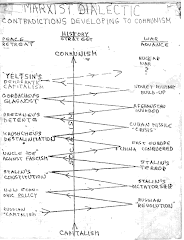There is a great old story about PT Barnum. One of his shows was so successful that the crowds were becoming dangerous. People were so packed that there was a real danger of some of them getting trampled. So, he had his carnies open some of the gates and his barkers start shouting "This way to see the great EGRESS!" The herd surged through the gates and found out that "egress" means "exit." -- Zenpriest
------------------------------------------------------------------------------
Genesis 3:16 - 19
(16) To the woman he said,
"I will greatly increase your pains in childbearing; with pain you will give birth to children. Your desire will be for your husband, and he will rule over you."
(17) To Adam he said,
"because you listened to your wife and ate from the tree about which I commanded you, 'You must not eat of it,'
"Cursed is the ground because of you; through painful toil you will eat of it all the days of your life.
(18) It will produce thorns and thistles for you, and you will eat the plants of the field.
(19) By the sweat of your brow you will eat your food until you return to the ground, since from it you were taken; for dust you are and to dust you will return."
------------------------------------------------------------------------------
One wonders, with all the talk about how much smarter women are than men... Have you ever heard men screeching and hollering for the "right" to be cursed like women?
And we're not gonna let you shirk your responsibilities anymore, ladies, because you have proven that you can do it... at least not until the stress of the workplace makes women die a few years earlier, or less stress makes men live a few years longer... because, um, you do believe in equality, eh? (And no, we are not looking for ways to find out how painful childbirth is - only idiots would do that). -- RF
Now read this:
http://www.thecanadianencyclopedia.com/index.cfm?PgNm=TCE&Params=M1ARTM0013170Men are Getting Happier (and Women More Miserable)It's not like Paul is a total writeoff. He cleans up the yard, makes sure the bills get paid, does far more than his share of the laundry. But when his common-law wife Catriona reflects on their relationship - and how casually her 32-year-old spouse has thrown off the cares of the workaday world - a note of resentment creeps into her voice. "Sometimes I get jealous of his freedom," admits the 25-year-old public relations coordinator from Vancouver. "He just doesn't get stressed, ever, really. I'm more uptight. I worry about a lot of things."Seven years ago, Paul quit a potentially lucrative job as a business consultant to try his hand at writing fiction, having decided there was more to life than climbing the corporate ladder. (Names of couples in this story have been changed.) The dynamic of their relationship shifted accordingly: Catriona is now the household breadwinner; Paul is living an urban male's dream. When he isn't working on his novel, he spends his days listening to music, riding his mountain bike or indulging his growing interest in urban development. Sometimes he reads books on the topic, and occasionally he strolls about the sites of local construction projects, getting a first-hand look at cutting-edge developments as they rise from the West Coast soil.
Catriona, meanwhile, scarcely has time for household chores or to attend the meetings of the charitable foundation she joined a few months back. With a high-tempo career and commitments to do volunteer work two or three times a week, she certainly can't while away a night at the bar watching Vancouver Canucks games, as Paul has been doing with increasing frequency. And while she doesn't consider herself miserable ("Paul supports me a lot in my work"), his general nonchalance clearly contributes to her anxiety. When he recently blew off an important appointment after a night of drinking with his brother, she fell into a black mood for days. "I'm not usually snarky," she says ruefully. "I realized later I was jealous or hostile or bitter that he didn't have to work and I did."
As the sands of gender roles shift in households and workplaces across the Western world, the future may hold more Catrionas and - to the fascination of social economists - a lot more Pauls. Far from suffering a crisis of confidence amid all those high-powered females, men are actually getting happier as the women around them find their place in the workforce, recent U.S. studies suggest. Blessed with salaried spouses and an economy that increasingly values their brains over their brawn, males now enjoy more of what one Princeton University scholar calls "neutral downtime" - a fancy term for hours spent watching football, playing computer games or drinking with their pals. For guys, things have never been better.
Their wives, moms and girlfriends cannot say the same. Adult females actually report lower levels of happiness now than before they streamed into the workplace in the 1970s and '80s, according to a study by two economists at the University of Pennsylvania's Wharton School, which has been making waves in academia since it was published in September. Previous studies of rising STRESS among females tended to focus on the simple burden of time allocation: instead of choosing one or the other, fully 73 per cent of Canadian women raise children and go to work. And numerous studies suggest women still bear the brunt of child-rearing and household duties even if they work - hence all the anxiety.
But the so-called "happiness gap," where more men than women tell pollsters they're pleased with their lives, has highlighted some unexpected trends in the interplay of the sexes. More and more males seem willing to take a back seat to the ambition of their wives, statistics show, content in the knowledge women can now make enough to support the whole family. According to a TD Economics report released last September, as a wife's annual income rises to $100,000, her husband is more likely to share domestic chores, or stay at home altogether.
Sometimes the shift can take constructive form: stay-at-home dads now make up some 11 per cent of married couples. But not all the guys are using their newfound freedom to become nurturers. Other studies suggest they use a good portion of it watching television or playing computer games. All of which raises questions that hardline feminists will undoubtedly find perverse, if not outright heretical. Are career pressures sucking the joy from day-to-day life for many women? Were they wrong to think professional success would ultimately yield happiness? And if the rise of financially successful, multi-tasking women over the past few decades is doing little more than allowing men to load up on couch time, who are the real beneficiaries of the women's movement?
The idea might seem less provocative if the women's movement of the 1970s hadn't promised the moon and the stars to begin with. On top of better jobs with better salaries, it told of a utopian future - a gender-neutral society where women and men would suddenly be considered absolutely equal. "We are talking about a society in which there will be no roles other than those chosen or those earned," feminist Gloria Steinem once pronounced with characteristic grandeur. And in some ways, the Steinem crowd delivered.
In its report, TD Economics said that participation in the workforce of Canadian women aged 25 to 44 jumped from 50 per cent 30 years ago to nearly 82 per cent in 2005. In fully 28 per cent of some 4.6 million couples surveyed, women had higher salaries than their husbands, compared to 11 per cent in the late 1960s - a figure broadly reflective of similar trends across the Western world. On average, U.S. women now earn 76.9 per cent as much as men (63.6 per cent as much in Canada), marking steady growth from the 59.4 per cent they earned in 1970.
Education saw even more sweeping change. By 2004, 62 per cent of all B.A.s in Canada were granted to women. Even more impressive is the revolution at medical school. According to the Association of Faculties of Medicine of Canada, the majority of students at 13 of Canada's 17 med schools are women. At Université Laval's faculty of medicine in Quebec City, for example, female enrolment has hit 70 per cent for the past two years, after peaking at a record 80 per cent in 2005, while on five other campuses last year more than 60 per cent of first-year medical students were women. And the laundry list of advancements goes on. Reliable birth control; more freedom at work; better vacuums and washing machines - all played their part in making women's lives easier. Yet the lift in women's spirits you might think would result is nowhere to be seen, say Betsey Stevenson and Justin Wolfers, co-authors of the Wharton study, "The Paradox of Declining Female Happiness." "We found that in the 35 years in which women made the greatest progress, they got less happy," Wolfers said in an interview from Philadelphia. "The big question is why."
One popular theory, to borrow a phrase from the financial world, is irrational exuberance. Through media imagery and peer pressure, goes this thinking, women have been encouraged in recent years to seek it all - be smart, accomplished, a good mother, a good lover and manage to look svelte and fashionable all at the same time - never realizing that the headlong pursuit of perfection would cause bone-numbing fatigue. Stevenson and Wolfers accept this explanation, but only to a point. "The natural thing for people to assume is, of course, women are less happy than men because they have to juggle a career and kids and they're tired," says Stevenson. "But this is not just a story about moms. It might be about women pushing themselves to excel."
It might also be a story about chemicals. Comprehensive studies of psychiatric data show that nearly twice as many women as men will develop depression-related disorders at some point in their lives, and the numbers are growing. In 1990, seven million American women suffered from depression; this year the number is up to 12 million, exactly twice as many as men. "Because this depression gender gap coincides with puberty and disappears after menopause," advises the Mayo Clinic in a publicly disseminated circular, "some researchers believe that hormonal factors increase." Even after puberty, with its attendant identity issues and screaming matches with mom, the risks for women remain disproportionately high. Premenstrual trouble, postpartum depression, menopause itself - all create a landscape fraught with psychological sinkholes for women as they go through life.
This is all a way of saying that whatever's making women sadder may merely be aggravating what's already in their heads. And that's where the gender wars come in. Some critics believe that by convincing females they could succeed in the workplace without sacrificing family life, the women's movement set up the vast majority for disappointment; whether you're talking hormones or spare time or fatigue, they're just not equipped to handle what the feminists envisioned. It's a theory so freighted with controversy that Wolfers jokingly calls it the "Rush Limbaugh interpretation," implying as it does that women were better off when they were barefoot in the kitchen. "Did the women's movement make things worse? Unattainable? Plausibly, yes," muses Wolfers. "The puzzling part of the data is not why women are unhappy today, but why they were so happy in 1970."
The counter-interpretation, say Stevenson and Wolfers, lies in women's aspirations outpacing society's attempts to accommodate them. In the 1970s, if women told pollsters they were happy, they were likely "comparing themselves to the housewife next door," explains Stevenson. Today, that's just not good enough. The educated, ambitious career woman is now inclined to compare herself to the man in the next cubicle - a shift in mindset no enlightened person would regard as a bad thing. That would be fine, says Stevenson, if perception of women in the workplace had caught up to reality. Instead, they still are too frequently treated as second-class colleagues. "I have had this happen to me," she says. "A woman says something in a meeting and she maybe doesn't say it quite as forcefully as she should and so a guy picks it up and everybody says 'Damn, what a great idea!' " Thirty years ago, says Stevenson, women felt glad just to be allowed into the meeting. "Now," she says, "you think, what the f-?"
WHATEVER THE REASON for female unhappiness, the success of women appears to be changing expectations for males as surely as it is for females. Imagine, for a moment, that you are Toby, a 27-year-old male and one-half of a Vancouver couple whose now-defunct relationship was recently described in detail to Maclean's. While your girlfriend, Sarah, also 27, works 60-hour weeks trying to get her small business off the ground, you follow your dream of becoming a musician, applying your time to playing gigs, smoking pot and hanging out at her apartment - not necessarily in that order. She is patient. "The fact he was an artist made it seem legitimate or justifiable," she later confides. "The idea was that there was a higher purpose that could also potentially pay off."
Toby eventually gets a job as a barista at Starbucks, but by then it's too late. She ditches him, and on reflection he marvels that the good times lasted as long as they did. But in the end, he's glad she dumped him because the fact she made more money was starting to make things kind of awkward. And it's not like he really wanted to change his lifestyle.
While the male layabout is an archetype in almost every human society, the idea of an intelligent, able-bodied North American man dedicating a good part of his existence to non-productive activity is relatively new. In the mid-1960s, men spent nearly half their time on paid work or work-like activities, according to Alan Krueger, a Princeton University economist and author of a recently released study comparing how men and women allocate time. By 2005, that had fallen to 36 per cent while the amount of time typically spent on unpleasant tasks declined marginally, and men suddenly found themselves with a surfeit of "neutral downtime," which offers in relaxation what it lacks in character-building. Forty years ago, watching TV and similar activity consumed 14.5 per cent of an average American man's day. Today it takes up nearly a quarter.
Some of this is due to technology, notes Krueger; a lot of former men's work is now performed by machines, both at work and around the home. But it's hard not to see the growth in their spare time with the concomitant reduction in women's. Unlike men, women are spending more time at paid work than they did in, say, the early 1970s, while their downtime has been steadily declining. To some experts, this points to males gaining R & R at females' expense. More troubling still, says Michael Kimmel, a sociologist at the State University of New York, Stoney Brook, the behaviour seems more deeply entrenched in each generation of males. "Young men today see the lives of their fathers as the opposite of fun," he says. "Sober. Parental. Responsible. It's taking a lot of these guys about eight years to commit to a career."
The result, he says, is a state of drift among men that in many cases doesn't lift until they reach their mid-30s. "They come out of high school with this incredible sense of entitlement," he says. "Virtually everyone I talk to here at the university thinks he's going to write for television and move to Hollywood." Most of them eventually snap out of it, adds Kimmel, but the short-term impact on women can be disconcerting. Some girls simper pathetically in the presence of dour slouches, preening for a bit of attention. Others, like Sarah, wait for emotionally stunted boyfriends to grow up so they can get married, buy a house and have kids.
As all this is going on, the respective life cycles of men and women are increasingly at odds, with serious potential consequences a generation or two down the line. While men are resisting the trappings of adulthood through their late 20s, revelling in the sort of infantile world depicted in the Will Ferrell comedy Old School, women are establishing careers and accumulating wealth. "Realistically, men can get their shit together at 40," laments Sarah. "They can catch some woman 13 or 14 years their junior just like me who's going to say okay, because all the guys my own age are turkeys."
Which is fine for women who find successful mates, or who happen to appreciate older guys. But pity those who must settle for a man who, at 40, never launched a career, frittered away his money, burned off a few too many brain cells and left the hard work of child-rearing until he was too tired to perform it well. That's as surefire a formula for female disaffection as a person can imagine. And if Kimmel's observations are anything to go by, it's one we'd better get used to.
It will be all the more irksome if another long-term trend that is transforming the workplace holds. While women are leading dual lives as employees and nurturers, they're steadily supplanting men as occupiers of the desk where the buck stops. In 2004, the proportion of women occupying managerial positions had reached 37 per cent - a number that today's feminists see as too low, but would nonetheless impress their mothers and grandmothers. In certain prestigious professions, women are actually overrepresented. Fully 55 per cent of the doctors and dentists in Canada are now women, up from 43 per cent in 1987; women make up more than half the business and financial professionals in this country.
All of this has unfolded according to the plans of the women's movement; if feminists have any complaint it's that it's gone too slowly (certain sectors, such as engineering and natural sciences, remain male-dominated). What no one seemed to anticipate was how women who attained heights formerly reserved for men would wind up feeling. How would they cope with the anxiety and long hours that come with rank and responsibility? How would they deal with the related pathologies of obsessiveness and workaholism - the curses, so to speak, of the ambitious classes?
Pretty much the way men do, it turns out. "The women's movement gave women permission to get on the gerbil wheel," says Barbara Killinger, a Toronto psychologist who has written extensively on workaholism. While almost no women came to her for treatment 25 years ago, fully half of her patient load today is female, she says, and they demonstrate the same addictive patterns as men. "There is a very definite breakdown syndrome: fears of failure, of laziness, of boredom, that other people will find out they are not effective; then chronic fatigue and paranoia. The obsession to work is coupled with the addiction for control."
Suffice to say, this is not the sort of analysis that sits well with modern feminists. As the data on female unhappiness piles up, they increasingly question the connection to careerism, or the entire premise of happiness surveys. "The women's movement was never about happiness," says the Pulitzer Prize-winning journalist and feminist Susan Faludi, in an assertion that will surely surprise many a woman who marched for equal rights. "It was about claiming one's full place in the world. What is described as women's unhappiness isn't about them being unable to handle all of these great new opportunities. It's unhappiness over the fact that things haven't changed: that they are still burdened with a second shift."
Perhaps. But the findings to date are disturbing enough to lead researchers to drill deeper in search of a more nuanced understanding of women's responses. Is unhappiness a reflection of their emotions on the day they are surveyed? Is it frustrated ambition, as Faludi would have it? Or is it something less tangible, such as spiritual hunger, or longing? Stevenson, for one, floats the hypothesis that women are simply conditioned to expect more from life than they did three decades ago. This tends to apply to all aspects of life, however, meaning all but the most gifted women are bound to run up against their own limitations. Stevenson tells a troubling story about a teenage girl who had just accomplished a near-perfect score on her college admission tests. She was brainy and athletic, but that wasn't enough. "She said it was very important to her to be 'effortlessly hot,' " Stevenson says. "I was flabbergasted."
The beneficiaries, of course, are the men lucky enough to have such women in their lives. They are gaining downtime by having a breadwinner. They get joy from their wives' accomplishments. They are fulfilled by the presence of physical beauty. If they are family-oriented, they may even get to become stay-at-home dads. For the few men who understand the price their spouses pay for happiness, it may inspire the sort of emotional generosity we tend to associate with females. But it's a safe bet for now that a good many won't. And if you told feminists 30 years ago that a generation of Tobys and Pauls would be the ones enjoying the fruits of women's efforts today, more than a few might have put down their placards and gone home.
.

Yes, it is time for a New World Order... not the one the fembots and their Marxist bedfellows were dreaming of though. Perhaps with all our free time we will take over this wicked movement and make it into something suitable for men. -- RF
-------------------------------------------------------------------------------
Further Reading:
Zenpriest #39 – Brer Patriarch
The Same Old Story – by Adam Kostakis
International Women’s Working Day – by V.I. Lenin





















































